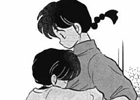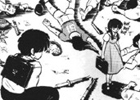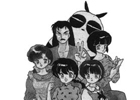Ranma ½
| Japanese Title: Ranma Nibun no Ichi | ||
| Also Known As: Ranma One-Half, Ranma Half | ||
| Genre: Action/Romance | ||
| Length: 38 Volumes | ||
| Allegiance: Shogakukan Productions Co., Ltd. | ||
| Mangaka: Rumiko Takahashi | ||
| Vintage: 1987-1996 | ||
| Intelligence Agency Report by: Lady Sage | ||
| Many years ago, best friends and martial artists Saotome Genma and Tendo Soun promised one another that someday, their children would marry and secure their legacies. Now, Genma has returned from a recent trip to China with his sixteen-year-old son Ranma to meet with Soun’s three daughters to make good on their promise. But the two have recently picked up a slight condition: since a visit to some cursed springs, when splashed with cold water, Ranma turns into a girl, resulting the selection of the boy-hating Tendo Akane as his bride-to-be. Little do they know their troubles are just beginning… | ||
|
|
||
| Research Agent Report by: Lady Sage | ||
| Plot Characters Impact Visual |
7.00 8.25 9.00 9.00 |
|
| Overall | 8.50 | |
| (not an average) | ||
| Ranma ½, although it isn’t particularly widely read nowadays, holds an important place in the history of manga in the U.S. Its run began in 1995, long before manga had reached the level of popularity it enjoys today. Because it was engaging yet easy to jump into at any point, it was Viz’s flagship title for many years and was an introductory title to many fans, myself included. After years of fandom and much wider exposure, I was worried that the series wouldn’t hold up to how it had first seemed to the newbie I was. However, I am happy to say that it still passes with flying colors.
The series has two basic modes: wacky and epic, with very little overlap between the two. The plot is next to nonexistent, and is generally advanced by one of two things: the entrance of a new character, or a character learning a new technique. In the hands of a lesser mangaka, such a series could get stale after only a few volumes. Fortunately though, Takahashi Rumiko is a master storyteller with an extremely fertile imagination. Although a plethora of running gags does make up a large part of the comedy, they tend to be used in such a way that they rarely get old – and balance out the situational and character-based comedy fairly well. Action-oriented arcs range from the absurd, such as a martial arts tea ceremony, to straightforward martial arts. Anything and everything is used for combat, with bizarre and often hilarious results. The more serious fights range from formulaic, such as whenever one of Ranma’s multitudinous rivals learns a new technique that he must learn to overcome, to positively suspenseful. They are also very well-drawn, a must for any decent action series. I do feel somewhat divided regarding the characters. Takahashi approaches characterization about the same way she approached plot: use the bare minimum to keep things from getting completely stagnant. Consequently, the characters are quite entertaining and often likable, but they change very little over the course of the series. Some, such as the Kuno siblings, are used for purely comedic reasons and thus are completely static. Others are used more as plot devices than as characters in their own right, especially some that are introduced towards the end of the manga. Then there are the protagonists: Ranma and Akane, the two I feel most ambivalent about. They both have more than enough negative qualities to make them entirely hateable: both are stubborn, hot-tempered, and jump to conclusions repeatedly, never learning their lesson. Ranma is arrogant and narcissistic, and Akane is a clear prototype of the shrieking harpies that swarm modern anime romance. But there is something about them that makes them appealing despite their emotional constipation: perhaps the slight awkwardness and vulnerability they occasionally let slip through the cracks; perhaps the slow, but ultimately satisfying progression of their relationship; perhaps some indefinable touch of the old Takahashi magic; or perhaps just because they’re so damn fun. Ranma ½ is a manga that knows its priorities, and executes them well: I laughed more often than not at the humor, and the action really got my heart pounding quite a few times. Even if plot and character development were sidelined a bit, I was genuinely engaged for the great majority of the series. Really, I have to give it credit for lasting so long and not only without losing steam entirely, but ending with a real bang.
|
||




